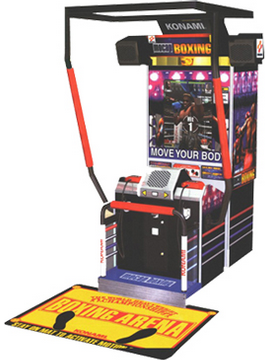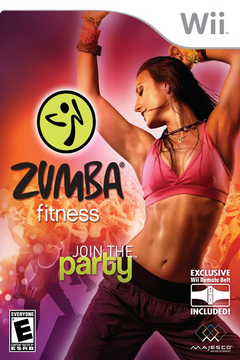| . | As a gamer-turned-fitness-professional, I'm continually amazed at what the gaming world has done as contribution to the fitness world. This has helped curb the negative stigma of video games contributing to the problem of obesity in children among other negative views of video games and health related problems. As the fitness industry continues to evolve in its training methodology and research, and coming out with better designed or new products, so too is the gaming industry in relation to fitness.
 One of the most significant gaming tools that pushed the boundaries between fitness and video games was the advent of the Nintendo Power Pad for the NES. Certainly by comparison to what we have today, the Power Pad was limited in its function. People could still "cheat" the game due to its design (such as doing rapid taps on the Power Pad with your feet to get the sprite in World Class Track Meet to run faster instead of lifting the leg up to simulate a full running stride). However, it was a start in the direction to get people to use their body as a controller. One of the most significant gaming tools that pushed the boundaries between fitness and video games was the advent of the Nintendo Power Pad for the NES. Certainly by comparison to what we have today, the Power Pad was limited in its function. People could still "cheat" the game due to its design (such as doing rapid taps on the Power Pad with your feet to get the sprite in World Class Track Meet to run faster instead of lifting the leg up to simulate a full running stride). However, it was a start in the direction to get people to use their body as a controller.
It won't be until the introduction of the Dance Dance Revolution series that we see the "Power Pad" concept taken to another level. By its game design, "cheating" is minimized. Also, the intent to integrate the entire body into the game is evident from the many that plays or have played these games. Still, you received no bonuses from what you do outside of your feet hitting the correct arrow pads at the right time. Nonetheless, it opened up opportunities for others to be creative with their dance moves.
 It was perhaps the mo-cap games that got me intrigued as to what the gaming industry could potentially do for the fitness industry. Mocap Boxing was a bit of a departure from the previous fitness related games in that you really integrated your entire body to play the game. There were still some drawbacks though. For one, you couldn't move outside the range of the sensors. Thus, you can't really make movements where you are walking or running about. Your feet are more or less planted in a single spot and the only actions coming out of the lower body was from the knee up. Another drawback is that the technology of the mo-cap system meant that you couldn't really take this to the home consoles. It was perhaps the mo-cap games that got me intrigued as to what the gaming industry could potentially do for the fitness industry. Mocap Boxing was a bit of a departure from the previous fitness related games in that you really integrated your entire body to play the game. There were still some drawbacks though. For one, you couldn't move outside the range of the sensors. Thus, you can't really make movements where you are walking or running about. Your feet are more or less planted in a single spot and the only actions coming out of the lower body was from the knee up. Another drawback is that the technology of the mo-cap system meant that you couldn't really take this to the home consoles.
It wasn't until the premiere of the Wii that displayed what could be the future of fitness and gaming. A remote that creates commands based on movements was a simple idea, but made for a lot of potential, especially when consoles overshadowed the arcades. We've seen the development of the accessory handles that could be fitted over the Wii Remote, we've seen the launch of Wii Sport, and we've seen the development of the Wii Fit games. It's not surprising that the competitors wanted a piece of the action, with the Xbox 360 coming out with Kinect and the PlayStation 3 coming out with PlayStation Move and PlayStation Eye; all while Nintendo ultimately redesigned the Wii Remote to the Wii MotionPlus.
 There is something to be said about competition in the gaming world, and that is that it presents an opportunity for game developers. We now have games that are on multiple platforms. Due to what is currently out there in terms of technology, we can now push the boundaries as to what we can classify as video game and what we can classify as fitness. We now have games such as Zumba Fitness that pretty much makes it like you are doing a Zumba class, all the way to UFC Personal Trainer where you can get the sensation of training like a fighter. On top of that, the respective people in the fitness industry are putting their names on and promoting these games. There is something to be said about competition in the gaming world, and that is that it presents an opportunity for game developers. We now have games that are on multiple platforms. Due to what is currently out there in terms of technology, we can now push the boundaries as to what we can classify as video game and what we can classify as fitness. We now have games such as Zumba Fitness that pretty much makes it like you are doing a Zumba class, all the way to UFC Personal Trainer where you can get the sensation of training like a fighter. On top of that, the respective people in the fitness industry are putting their names on and promoting these games.
We've certainly gone beyond simply pressing buttons to control a sprite in a sport game. Although these games are still prevalent, there seems to be an increase in sport/fitness games where we become the characters and where we use our entire body to as a controller. We've gone from an era where "cheating" is permissible to an era where you not only have to develop gaming skills, but also skills usable in fitness.
| . |
 One of the most significant gaming tools that pushed the boundaries between fitness and video games was the advent of the Nintendo Power Pad for the NES. Certainly by comparison to what we have today, the Power Pad was limited in its function. People could still "cheat" the game due to its design (such as doing rapid taps on the Power Pad with your feet to get the sprite in World Class Track Meet to run faster instead of lifting the leg up to simulate a full running stride). However, it was a start in the direction to get people to use their body as a controller.
One of the most significant gaming tools that pushed the boundaries between fitness and video games was the advent of the Nintendo Power Pad for the NES. Certainly by comparison to what we have today, the Power Pad was limited in its function. People could still "cheat" the game due to its design (such as doing rapid taps on the Power Pad with your feet to get the sprite in World Class Track Meet to run faster instead of lifting the leg up to simulate a full running stride). However, it was a start in the direction to get people to use their body as a controller. It was perhaps the mo-cap games that got me intrigued as to what the gaming industry could potentially do for the fitness industry. Mocap Boxing was a bit of a departure from the previous fitness related games in that you really integrated your entire body to play the game. There were still some drawbacks though. For one, you couldn't move outside the range of the sensors. Thus, you can't really make movements where you are walking or running about. Your feet are more or less planted in a single spot and the only actions coming out of the lower body was from the knee up. Another drawback is that the technology of the mo-cap system meant that you couldn't really take this to the home consoles.
It was perhaps the mo-cap games that got me intrigued as to what the gaming industry could potentially do for the fitness industry. Mocap Boxing was a bit of a departure from the previous fitness related games in that you really integrated your entire body to play the game. There were still some drawbacks though. For one, you couldn't move outside the range of the sensors. Thus, you can't really make movements where you are walking or running about. Your feet are more or less planted in a single spot and the only actions coming out of the lower body was from the knee up. Another drawback is that the technology of the mo-cap system meant that you couldn't really take this to the home consoles. There is something to be said about competition in the gaming world, and that is that it presents an opportunity for game developers. We now have games that are on multiple platforms. Due to what is currently out there in terms of technology, we can now push the boundaries as to what we can classify as video game and what we can classify as fitness. We now have games such as Zumba Fitness that pretty much makes it like you are doing a Zumba class, all the way to UFC Personal Trainer where you can get the sensation of training like a fighter. On top of that, the respective people in the fitness industry are putting their names on and promoting these games.
There is something to be said about competition in the gaming world, and that is that it presents an opportunity for game developers. We now have games that are on multiple platforms. Due to what is currently out there in terms of technology, we can now push the boundaries as to what we can classify as video game and what we can classify as fitness. We now have games such as Zumba Fitness that pretty much makes it like you are doing a Zumba class, all the way to UFC Personal Trainer where you can get the sensation of training like a fighter. On top of that, the respective people in the fitness industry are putting their names on and promoting these games.